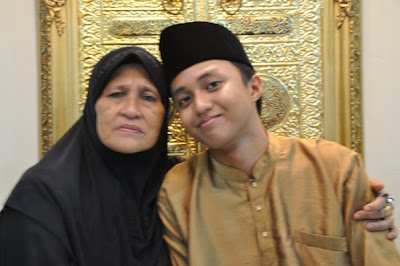Albert Einstein.
As the world deeps itself into a midst of hell fire, never did they realise that actually the cause of their absolute ambiguity in the predicament of the economic weather comes from thyself.
"Man is the vicegerent of Allah on Earth." (Quran, 2:30)
But do they?
According to Straits Times, the recent fall of the Lehmann Brothers, and other giant banks and henceforth unleashed a domino effect creating disastrous paths that shred Iceland's economy to bankruptcy, and sent ripples throughout Asia. The first country in Asia to hit the fall- Japan, suffered relentless crusade of enormous bank loans and smells of an economic recession.
But the purpose of me discussing the issue is what causes the downfall, but the root reason why it all happened.
A simple answer. Humans are too obsessed with material value and luxurious comfort.
One should notably accept that as the world marches towards a Profound Era, we have staked ourselves with our an-nafs; the idea of luxury and comfort has capitalized our mindset of how we view life as a whole. Detailed structures of thoughts, like ideal lifestyle, the capability to grasp constructive predictions with the aid of technologies and the use of human intelligence to achieve once known to be 'impossible' has made us forget that in perfection, lies the killer slice of a set of anomalies considered to be 'the negative codes of the human spirit.' We have yet to understand and accept, that like the rest that is created, we are imperfect. And even if we do strive towards perfection, we are still imperfect to contain such perfection. It is like a dirty leaking container being filled up with holy pure water. As such, in our own aspects of life, perfection begets imperfection. This is not applicable to God, for He is Omnipotent and Perfect, and His Perfection begets life. And thus, we must reflect on ourselves. Much to our dismay, social dogmatics of what we perceived to be 'luxurious comfort' such as owning a Plasma 30 inch TV, or purchasing a set of Nintendo WII despite having an XBOX 360 or a PS2, or even owning a branded Coach bag but feels it is not the one to be worn during a DnD and thus purchase a new, more expensive bag from Loius Vutton. Such atrocious acts provokes the evil of 'spending more than you desire.' Why encourage ourselves to spend more? I have came across a customer when I was working in DFS. As usual, I pushed sales, informing him that we are having a Mastercard promotion and if she were to use her Mastercard to spend $400, she can redeem $40 DFS voucher. Her response?
"I don't need the voucher. I have that amount of money already."
It is time for us to reflect on our ideas and our principles as we try to sail across a storm many economist predicts to be the worst depression in any age.
I may like to discuss a few aspects of the credit system practiced by the West.
The terms Debit and Credit have latin roots. Debit comes from debere, which means "to owe". The Latin debitum means "debt". Credit comes from the Latin word credere, which means "to believe" or "to entrust".
The first bank card, named "Charg-It," was introduced in 1946 by John Biggins, a banker in Brooklyn, according to MasterCard. When a customer used it for a purchase, the bill was forwarded to Biggins' bank. The bank reimbursed the merchant and obtained payment from the customer. The catches: Purchases could only be made locally, and Charg-It cardholders had to have an account at Biggins' bank. In 1951, the first bank credit card appeared in New York's Franklin National Bank for loan customers. It also could be used only by the bank's account holders.
It is mentioned in a Hadith, "He who grants a respite to one who is in straightened circumstances or who remits his debt, will be saved by God from the anxieties of the Day of Resurrection."
(Muslim).
As mentioned, Islamic Economy encourages respite- giving temporary relief to those who are in debt. Respite as a noun, is clearly defined as 'a (temporary) relief from harm or discomfort'.1 However, the loan system in the West instead introduces usury- a system of interests. According to a hadith by Muslim, "Gold is to be paid by gold, silver by silver, wheat by wheat, barley by barley, dates by dates and salt by salt, like for like, payment being made on the spot. If anyone gives more or asks for more, he has dealt in usury. The receiver and the giver are equally guilty." This shows the amount of instigation the West applies on the World Economy. Clearly, when a person is on debt, by Islamic Farai'd, one should not burden the other.
This concept of open transparency, much evident in many Islamic businesses, and also proven by how Rasulullah SAW trades and deals with Khadijah's trading company until he was given the name 'Al-Amin'; the Honest One, has proven to be a useful medium. Recent market difficulties, most notably the credit crunch, could act as yet another incentive for investors to flock to Islamic banking. The animating religious goal behind the restrictions is to achieve greater social justice by sharing risk and reward. Islamic finance bans people from selling what they don't own, which rules out short selling, and from engaging in contracts deemed to have excessive uncertainty on either side. That rules out traditional insurance, so Islamic banks have instead developed takaful, in which a group of people pool risk.
To be sure, from the Bible to Buddhism, most of the world's faiths have issued warnings against usury, and theologians through the ages have debated the line between permissible and excessive interest rates. But ultimately, in the West, governments and religious authorities deemed some amount of interest permissible.
However in Islam, most scholars deem fixed-interest payments forbidden. For example, the sukuk issuer does not sell a debt, as a traditional bond issuer would, but rather sells a portion of an asset, on which the buyer is then entitled to receive rent. Likewise, rather than take out an interest-bearing loan, a business in need of financing might enter a musharaka, a partnership with profit-and-loss sharing. And thus, instead of burdening the party, it encourages another business opportunity.
The world’s 100 largest wholly Islamic banks, according to Asian Banker Research, hold almost $350 billion in assets and reported an average yearly asset growth rate of 26.7 percent, outpacing the 19.3 percent growth recorded by the world’s largest 100 conventional banks in 2006.
The growth of Islamic Economy is attributed to a few factors.
- Increase in Islamic awareness since the 911 event. Ibrahim Warde, author of Islamic Finance in the Global Economy and an adjunct professor of international business at Tufts University says, 'there was a feeling in many countries that Islam was a religion under siege.'
- Malaysia's intelligent approach towards Islamic Banking. After the 911 events, the US administration froze several prominent Saudis, which triggered other wealthy Arabs to withdraw their funds from the United States. Incapable of investing their funds in their respective countries, they turn to Malaysia's sophisticated Islamic finance. Malaysia was the first country to introduce sukuk (islamic bond) This spurred competition and the emergence of Islamic Economy.
- The whole idea is a fundamental approach to money. Islamic banks operate on the principle of sharing risk and reward among all parties in a business venture. Money cannot make more money. Money must be used productively. This fundamental theory does not work in tandem to the western ideologies of interest-making economy. The fall of Lehmann Brothers, and following a ripple of destruction that spreaded across the globe until Iceland was nearly state-bankrupt showed the crippling side of such structure. An alternative to the once powerful economic structure is refreshing and after all, the transparent way of dealing with shares- open concept of where the money is funded, and equal sharing of risk provides a more safer conservative approach.
- Result-orientated people will expected better outcomes from investments in islamic banks. Supporting this statement is second finance minister Mohamed Nor Yakcop in the three-day summit in the Bahraini capital manama. He emphasized that none of Malaysia's Islamic banks have been hit by write-downs resulting from the crisis and the resulting global credit crunch. He said holders of sukuk or Islamic bonds have been shielded from the worst effects of the subprime mortgage meltdown. This might be partly due to the fact that Islamic Banking investors are not involved in the international economic conflict. But largely, the very basis of gaining money by means of sukuk instead of interest makes Syariah-abiding economic concept more interesting and stable.
And to sum it all up, the growth of Islamic finance will spur more others to indulge themselves into a more prospectable operation, and thus my personal prediction would be, the welcoming prospects of an awakening strong Islamic Economy, with a birth of its own currency, perhaps, dinars, and the march towards the end of time, with Islamic Nations unified under a banner, socially, economically, and politically, and with that, the Golden Era of Islam led by the return of Jesus (Prophet Isa A.S) and muslim leader Imam Mahdi, and thus the sudden dip in humanity, and carrying with it, the ultimate destruction of Life, as God has decided.
May Allah save us all. Wslm.
Moving on to a softer note, I must apologise for my demise from the world. I understand I was away for more than a month or two. I have subjected my own thoughts to my own, and went to exile to learn more about myself and what I must do in life. And thus, I think I became a better person. Now to just brush up on my harsh uncivilised vocabularies as pointed out by a fierce woman who has made feelings with my big brother. Haha.
Yesterday was fun. Although the BBQ didn't turn out the way we wanted it to be, but we boys couldn't care less. Instead, we went back to Harold's crib and cooked burgers, and with my big brother, me Taha and Harold spent the rest of the days laughing and cursing each other as we battled out as a team playing my ps2 in soccer. It was a joyful experience, as I was untouched by the world ever since the 20th of Ramadhan. I can view it as a refreshing start to the many stupid antics of Hazlami.
And to top it all off, Harold and Kumar are back! Hahaha! Ok maybe Arafat (that's what Harold's mum call Taha) also, but still, the spotlight is on us haha! Wait for me buddy!
We shall conquer the world!! (but maybe SIM first la haha)
PS: This song spurs me on to be the best.
Orewa, Kaizoku Ouja!!!!!!!
Citations
[1] American Psychological Association (APA):
respite. (n.d.). WordNet® 3.0. Retrieved November 15, 2008, from Dictionary.com website: http://dictionary.reference.com/browse/respite


